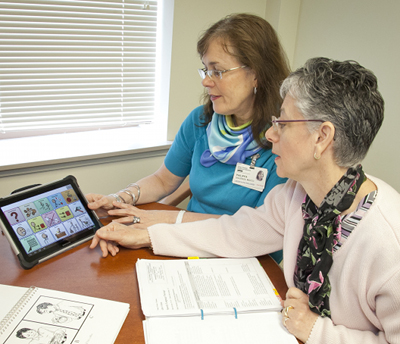Speech therapy is core to rehabilitation at Jefferson Moss-Magee Rehabilitation for both inpatients and outpatients. Our speech therapists work with people who are recovering from brain injuries, strokes, spinal cord injuries and numerous other conditions. They tackle everything from issues around speaking clearly to swallowing disorders and aphasia.
The following discussion of speech therapy at Jefferson is excerpted from an interview with Pippa Siguenza, MS, CCC, SLP and Paula Sobel, MA, CCC, SLP, who work with outpatients at the Main Campus in Elkins Park. They bring a combined 63 years of speech/language therapy experience to their Jefferson patients.
![]()

What is speech therapy?
The term “speech therapy” does not clearly reflect the extent of our profession. “Speech therapy” implies addressing how clearly one speaks. We go beyond that. We are speech/language/swallowing therapists: We do a lot of work with language (how one comprehends and expresses wants, needs, ideas and opinions), swallowing and cognition (executive functions, memory, judgment, problem solving, divided attention, reasoning, etc.)
Can you explain how speech/language therapists at Jefferson typically spend their day?
We evaluate and treat patients and educate families. We meet with colleagues to discuss patients and share ideas. We work as a team with physical therapists, occupational therapists, psychologists, physiatrists and other professionals to provide optimal treatment for our patients. We provide in-services to share information about continuing education classes. Documentation is a key component of our day to ensure quality care and ongoing insurance authorization. We negotiate with insurance companies to get coverage for our patients. Those are just a few of the things we do. We also work together to develop and market our program both within the network and in the community.
Who are the typical patients that you work with?
Most of our patients are recovering from a stroke, but we also work with individuals with brain tumors, traumatic brain injury, multiple sclerosis, Parkinson’s disease, voice disorders, etc. Generally, our patients are people who have neurologic disabilities.
How is the work of a speech/language therapist at Jefferson different than speech/language therapists that work at schools or other facilities?
The main thing is that we work with adults facing traumatic injuries and conditions—people who are aware of what they have lost. They are looking at a return to roles—work, leisure activities, family functions. Our patients have experienced an acquired event in their adult years. Communication difficulties stem from medical rather than developmental causes.
You are dealing often with patients who face major obstacles. What are some of the toughest challenges to providing speech/language therapy in that environment?
Patients are usually referred to outpatient rehabilitation after an inpatient hospital stay or a traumatic event that affected their communication, their cognition and/or their swallowing. These are such basic human activities—the most significant challenge is to help them regain their skills and cope with their disability.
We have a lot of young stroke survivor patients now. In the past when you heard that someone had a stroke you thought of someone who was older—in their 70s, 80s, 90s. Now we have stroke survivor patients in their 20s, 30s, 40s. Many of the people on our caseloads are between 30 and 60 years old. One challenge is incorporating role reversals. Those are great challenges. People’s life goals have been totally altered.
Does the level of impairment among Jefferson patients affect how you deliver speech/language therapy?
In terms of long-term goals, level of ability does not affect how we deliver therapy. We see everybody as a whole person—pulling everyone (professionals, family, friends, etc.) in that we need to make sure the patient’s long-term goals—even beyond rehab—are taken into consideration. As outpatient speech/language pathologists, we are often the patient’s last step—helping them make the final moves to go back to work or school or home.
What are the most rewarding aspects of this work?
Rewards are many in this environment. The most rewarding is when someone tells you, “I used that strategy when I was out with my friends and it worked.” Or, “I signed up for a cake decorating class at the local art supplies store, and I could actually use my strategies to ask the woman to help me understand what she was saying.” It’s those things that go beyond a thank you. It’s knowing that what you are doing is making a difference in a patient’s life. It’s getting patients back to interacting with their family, their friends, their community.
Looking ahead, is there anything you see on the horizon that you are particularly excited about?
Our relationships with the Moss Rehabilitation Research Institute and the Jefferson Aphasia Center give us a connection to the up and coming research and strategies that can support our clinical treatment. That, combined with the advances in technology, point us toward exciting future developments.
To learn more about our speech/language therapy services, please call 1-800-CALL MOSS or use our Contact Us page